UCRN Speaker Series
Nature Based Solution for Urban Resilience
27 Sep., 2024 (8:00 PM Beijing/ 2:00 PM Amsterdam)) -- Zoom (detail information click the flyer)
| |
|
|
|
| |
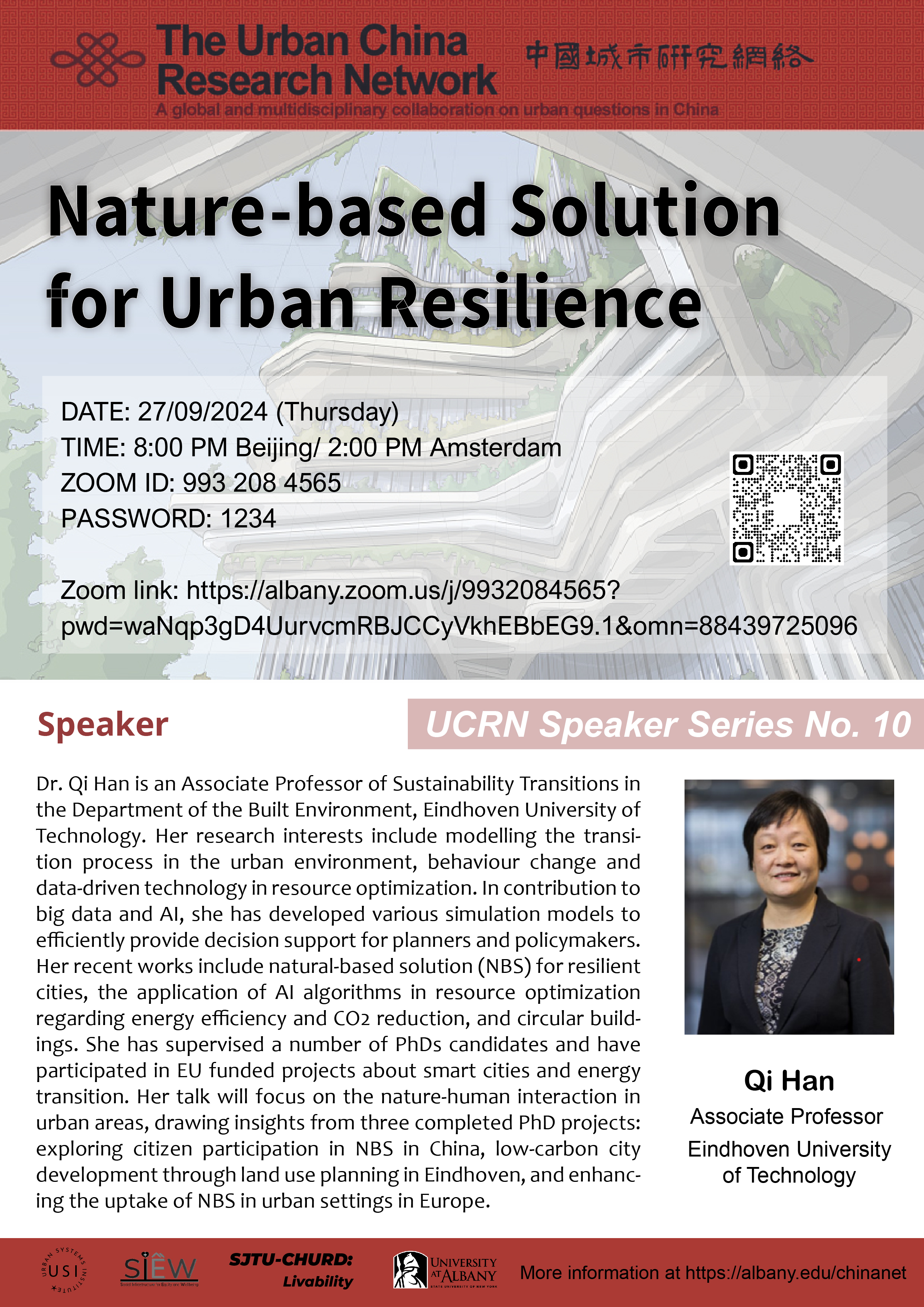 |
Dr. Qi Han is an Associate Professor of Sustainability Transitions in the Department of the Built Environment, Eindhoven University of Technology. Her research interests include modelling the transition process in the urban environment, behaviour change and data-driven technology in resource optimization.
In contribution to big data and Al, she has developed various simulation models to efficiently provide decision support for planners and policymakers. Her recent works include natural-based solution (NBS) for resilient cities, the application of Al algorithms in resource optimization regarding energy efficiency and CO2 reduction, and circular buildings. She has supervised a number of PhDs candidates and have participated in EU funded projects about smart cities and energy transition. Her talk will focus on the nature-human interaction in urban areas, drawing insights from three completed PhD projects: exploring citizen participation in NBS in China, low-carbon city development through land use planning in Eindhoven, and enhancing the uptake of NBS in urban settings in Europe.
| ; |
| |
Entrepreneurial Welfare Mix: Community-Based Old Age Services in China
21 June, 2024 (16:00 – 17:30)) -- Zoom (detail information click the flyer)
| |
|
|
|
| |
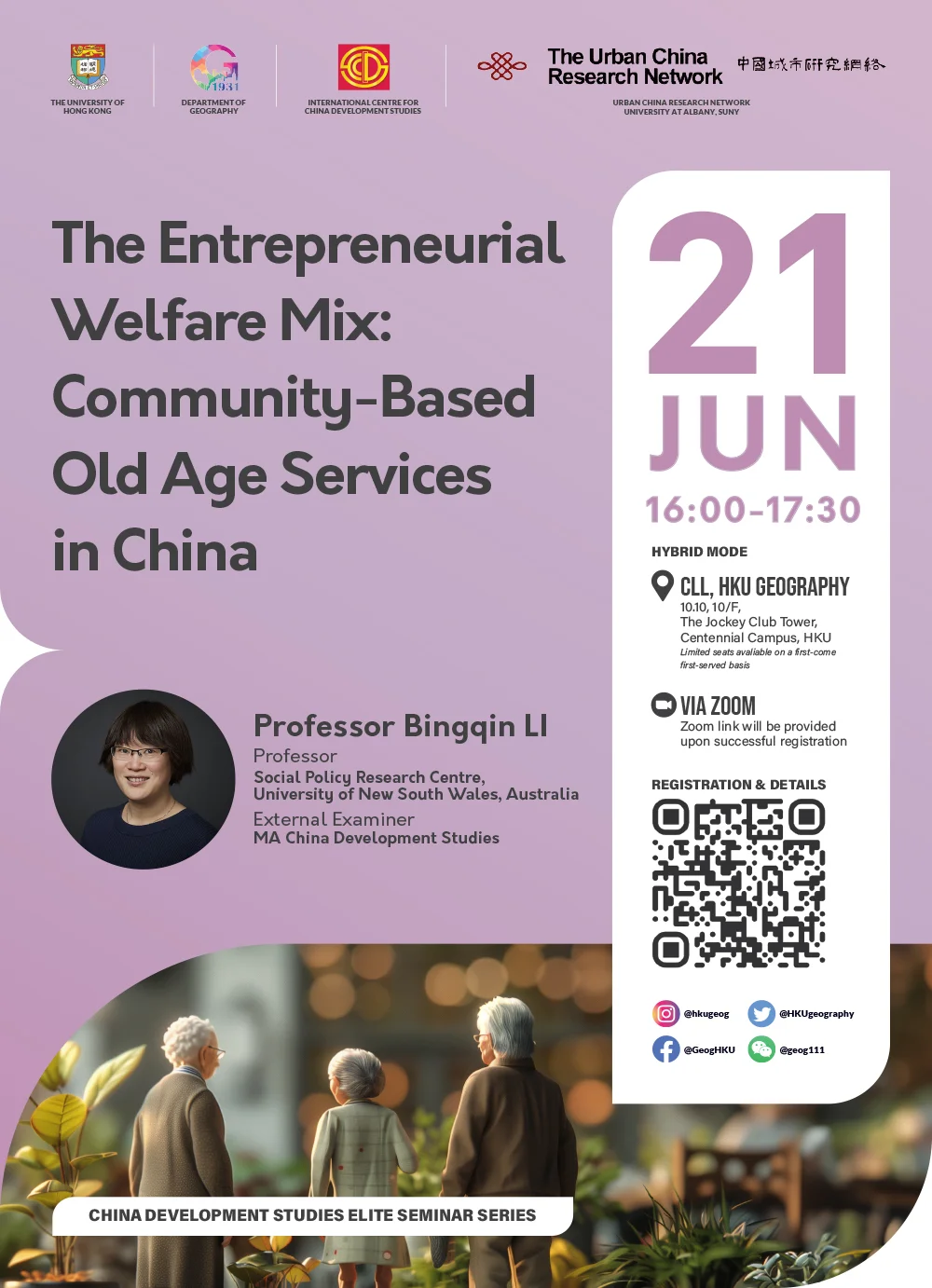 |
Abstract:
Developing an old-age service system that can meet the fast-growing needs of the aging population is challenging. It is increasingly recognized that community-level services should be pivotal in providing services to older people. In this talk, I analyze the experience of community based old age service system in China and argue that the stakeholders of the system are involved in strategies, take risks and search for a viable “business model”. The research draws upon my field research conducted over ten years 2015-2024. The findings show that the old age service system has evolved into a dynamic entrepreneurial welfare mix that actively uses market solutions to address the demand of the society and the state. This research contributes to the theoretical development of the welfare mix. I also discuss the benefits and challenges of this system.
Bingqin Li is Professor in the Social Policy Research Centre at University of New South Wales in Australia and an Honorary Professor at the China Studies Centre at University of Sydney and a research affiliate with University of Johannesburg. Her research is on social inclusion and social policy governance on China and Australia. She received a PhD in social policy at LSE, UK and a PhD in economics at Nankai University, China. She is the current Chair of East Asian Social Policy Research Network.
She had worked with multiple international organizations including EU, World Bank, UNICEF and other UN agencies on various social policy issues in China. For many years, she has advocated to and advised the Chinese governments at different levels to improve social inclusion of rural to urban migrants and people with disability, and to support active aging.
| ; |
| |
Governing China's Great Urban Transformation: From "Decentralization of Governance" to "Governance of Decentralization"
10 Mar, 2024 (15:00 – 16:30)) -- Zoom (detail information click the flyer)
| |
|
|
|
| |
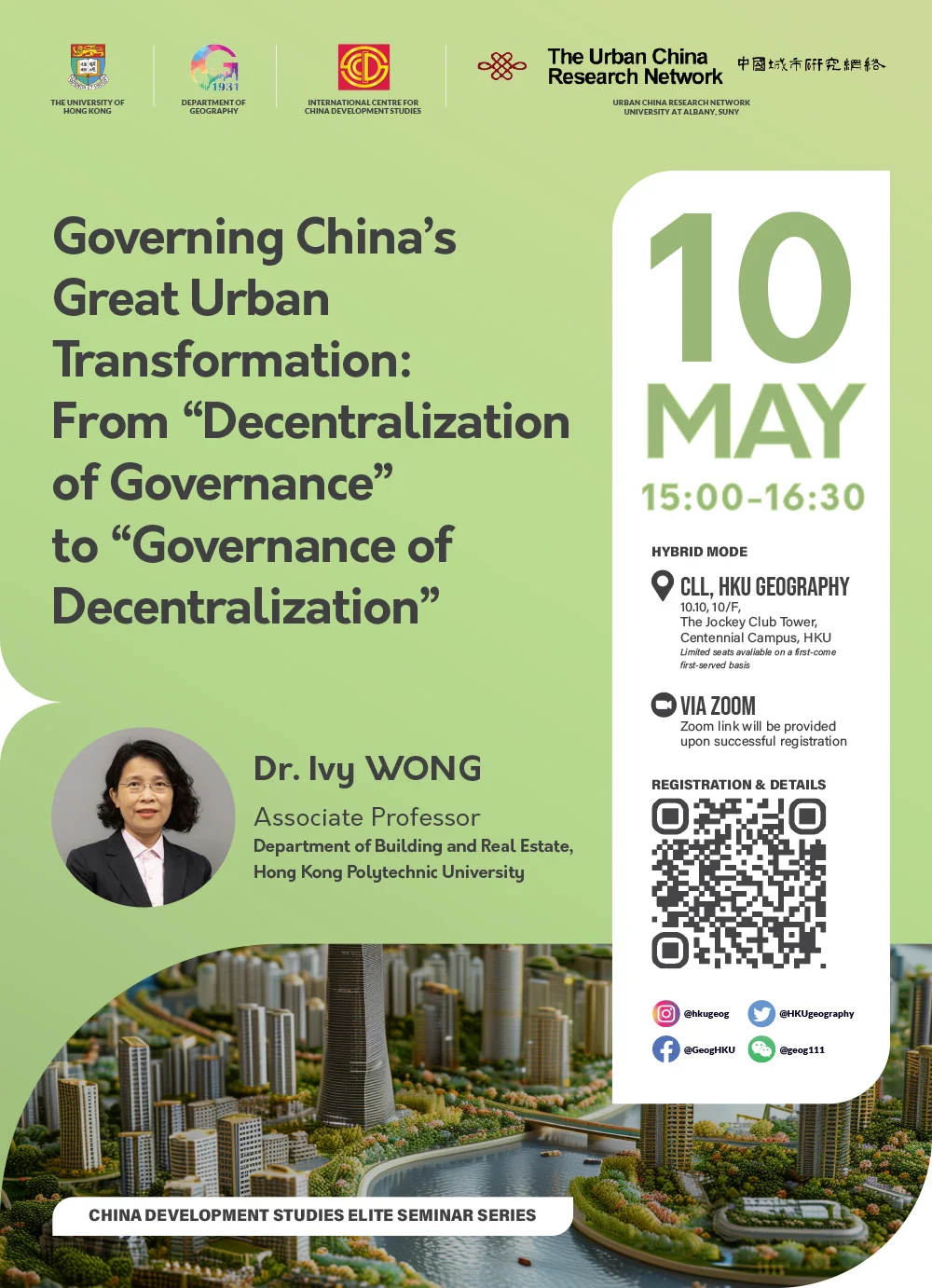 |
Abstract:
Between the 1980s and the early 2000s, the Chinese government’s efforts to promote local economic development and decentralized decision-making resulted in significant disparities in wealth accumulation at local levels. The specific development processes and outcomes in different periurban areas of China show that fiscal and administrative decentralization did not lead to a consistent pattern of local government involvement in socio-economic development. However, these varying governance outcomes do not indicate a decrease in the central state’s authority over local government. Through an empirical study of the interplay between the decentralization of state power and growing income inequality in over 40 villages in Guangzhou, this presentation illustrates how decentralization has led to horizontal fragmentation of the governance structure at the village level, rather than vertical fragmentation of the bureaucratic governance system. As a result of this horizontal fragmentation, the power of informal clan-based institutions has been weakened, rather than that of the state.
Dr. Ivy WONG
Associate Professor, Department of Building and Real Estate, Hong Kong Polytechnic University
Dr Ivy Siu Wai Wong, an associate Professor at the Department of Building and Real Estate at Hong Kong Polytechnic University, received her PhD in Planning from the University of British Columbia. Her academic research focuses on urban-rural planning and governance, addressing issues such as urban-rural planning for sustainable development, rural property rights reforms for social equities, participatory community planning for capacity building, and countryside conservation. These issues are of great significance not only for China but also for other regions and nations undergoing urban transitions. Her research findings have been widely published in international academic journals, including Environment and Planning A: Economy and Space, The China Quarterly, International Journal of Urban and Regional Research, Journal of Planning Education and Research, Journal of Urban History, Landscape and Urban Planning, Land Use Policy, and Urban Studies.
| ; |
| |
Smart urban governance: Governing cities in the "smart" era
26 APR, 2024 (16:00 – 17:30)) -- Zoom (detail information click the flyer)
| |
|
|
|
| |
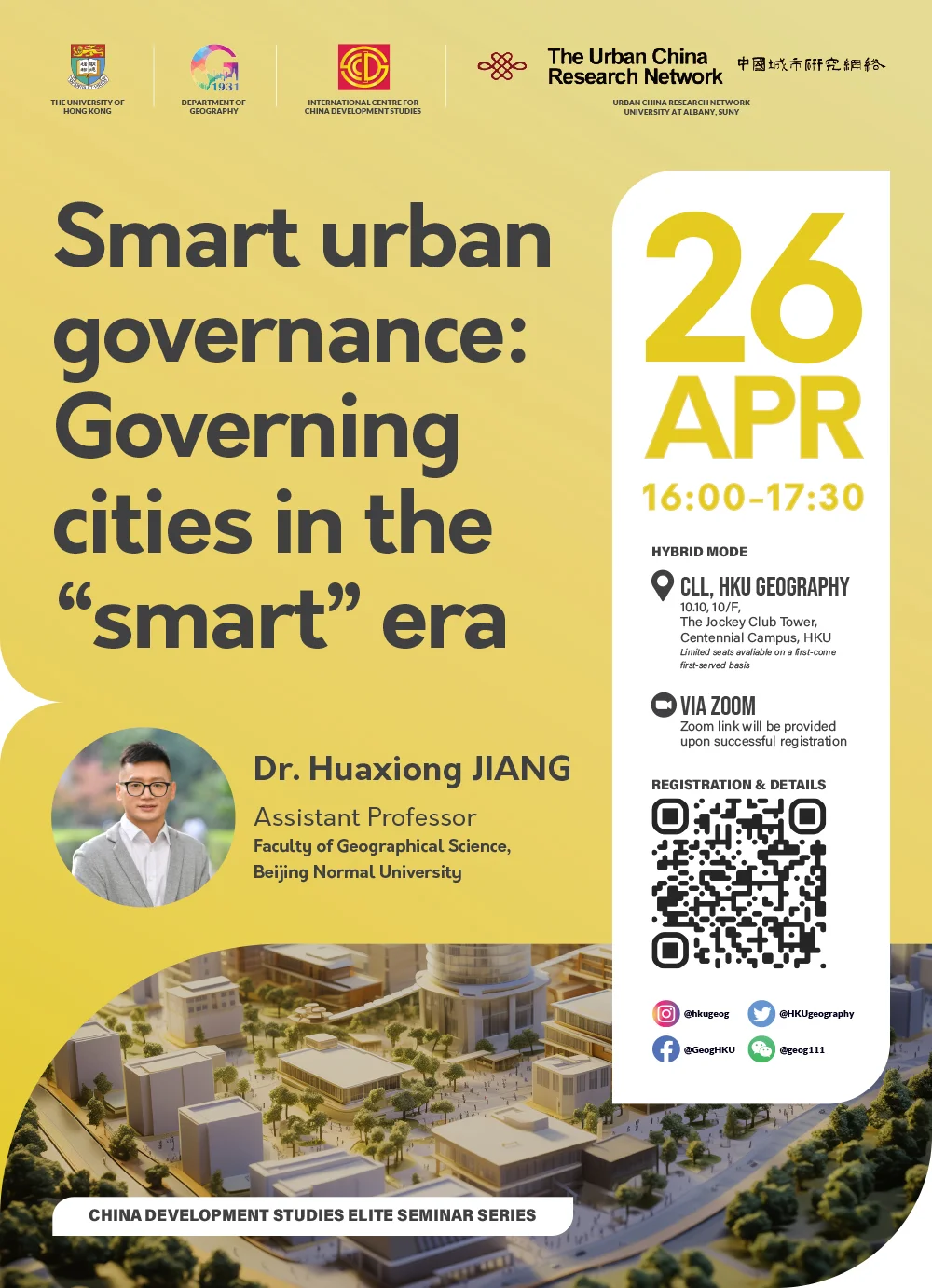 |
Abstract:
The advent of technology has ushered in an era of "smart cities," where urban spaces are increasingly infused with information and communication technologies (ICTs) to enhance efficiency, sustainability, and quality of life. This presentation explores the concept of smart urban governance, focusing on the strategies and challenges associated with governing cities in this rapidly evolving landscape. Drawing on interdisciplinary literature and empirical materials, it examines the roles of various stakeholders and different types of ICTs in shaping the governance structures in the context of smart cities. Three key types of smart governance approaches are identified and categorized, including technocratic smart governance, participatory smart governance and smart open governance. Key themes explored include the use of data-driven decision-making, citizen engagement through participatory platforms, and the smart open response to the sudden urban disasters in a “pop-up” way. The presentation also discusses policy implications and identifies areas for further research to advance our understanding of smart urban governance. Overall, it underscores the importance of adaptive, context-oriented governance approaches that can harness the potential of technology while addressing the complex socio-technical challenges inherent in the smart city paradigm.
Dr. Huaxiong JIANG
Assistant Professor, Faculty of Geographical Science, Beijing Normal University
Huaxiong Jiang (蒋华雄) is Assistant Professor at the Faculty of Geographical Science of Beijing Normal University, Beijing. He holds a PhD in Human Geography from Utrecht University, The Netherland (2021). His research mainly focuses on smart urban governance, planning support systems, and disaster emergency response. He has led research projects funded by the National Natural Science Foundation of China and Peking University - Lincoln Institute of Land Policy Youth Fund, among others. He has authored or co-authored nearly 30 international, peer-reviewed academic journal articles such as Computers Environment and Urban Systems, Cities, Journal of Urban Technology, Environment and Planning B, Health and Place, Land Use Policy etc.
| ; |
| |
China as a New Immigrant Destination Country: Macro and Micro Perspectives
11 April 2024 (9:00 AM EDT / 9:00 PM BJT)) -- Zoom (detail information click the flyer)
| |
|
|
|
| |
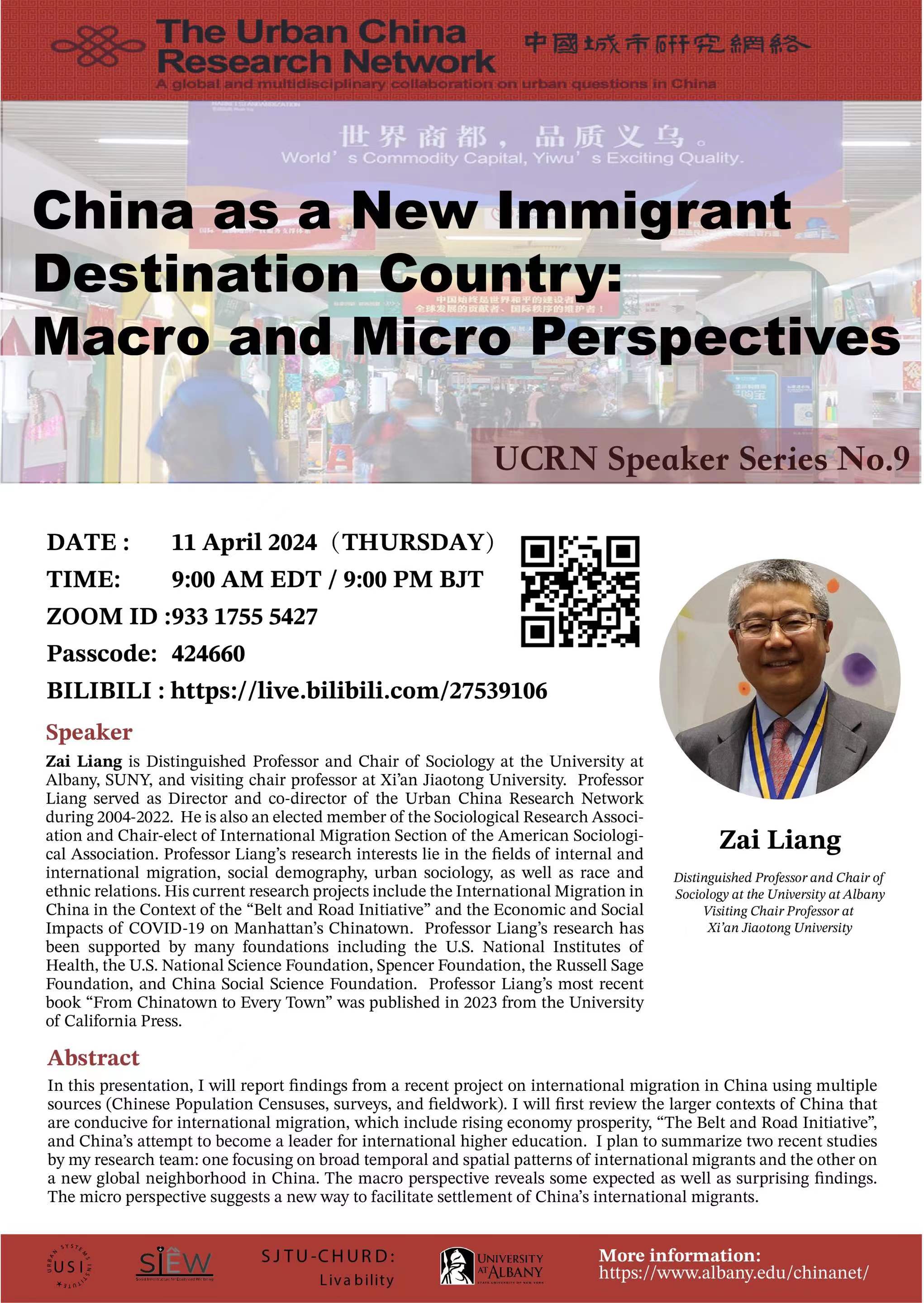 |
Abstract:
In this presentation, I will report findings from a recent project on international migration in China using multiple data sources (Chinese population censuses, surveys, and fieldwork). I will first review the larger contexts of China that drive recent international migration, which include rising economy prosperity, “The Belt and Road Initiative,” and China’s new desire for international higher education. I plan to summarize two recent studies focusing on broad temporal and spatial patterns of international migrants and the other on impacts of COVID-19 on Manhattan's Chinatown. The macro perspectives reveal some expected as well as surprising findings. I will also explore new ways to facilitate the integration of China’s international migrants.
Zai Liang
Distinguished Professor and Chair of Sociology at the University at Albany, SUNY, and visiting chair professor at Xi’an Jiaotong University.
Professor Liang served as Director and co-director of the Urban China Research Network during 2004-2022. He is also an elected member of the Sociological Research Association and Chair-elect of the International Migration Section of the American Sociological Association. Professor Liang’s research interests lie in the fields of internal and international migration, social demography, urban sociology, as well as race and ethnic relations. His current research projects include the International Migration in China in the Context of the “Belt and Road Initiative” and the Economic and Social Impacts of COVID-19 on Manhattan’s Chinatown. Professor Liang’s research has been supported by many foundations including the U.S. National Institutes of Health, the U.S. National Science Foundation, Spencer Foundation, the Russell Sage Foundation, and China Social Science Foundation. Professor Liang’s most recent book "From Chinatown to Every Town" was published in 2023 from the University of California Press.
| ; |
| |
The Lockdown,[IM]Mobility, and Health Disparities in the Covid-19 Pandemic in Major American Cities
8 Mar, 2024 (16:00–17:30)) -- Zoom (detail information click the flyer)
| |
|
|
|
| |
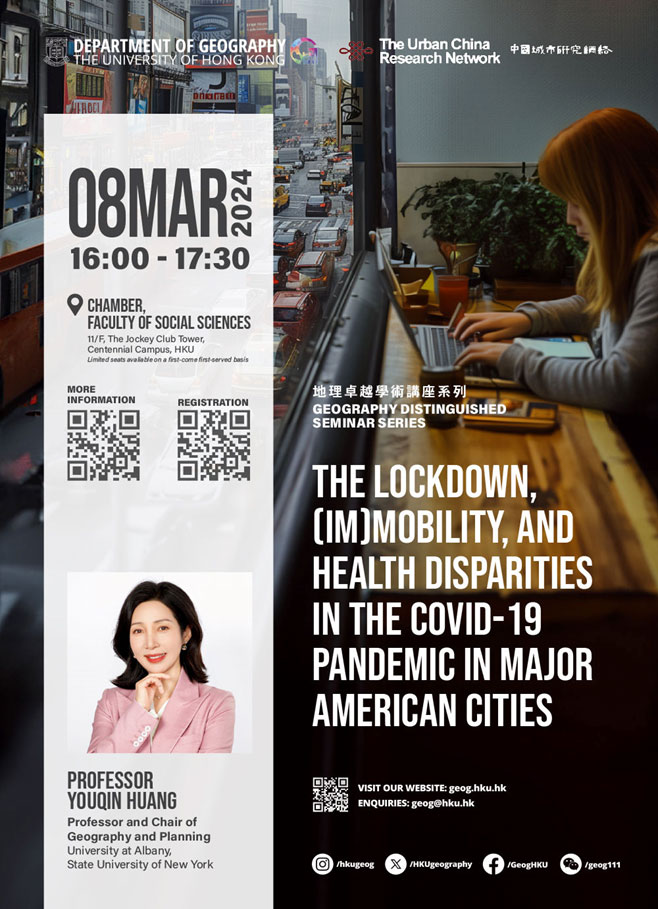 |
Abstract:
Much of the world has adopted unprecedented lockdown policies as the key method to mitigate the spread of COVID-19; yet their effect on pandemic outcomes remains largely unknown. This research determines how mobility restriction policies shape intra-city health disparities in major American cities. With a spatial method and multiple sources of data including cellphone mobility data, this research demonstrates the effectiveness of the stay-at-home order and working from home (WFH). On average, people spent about 20% more time at home in 2020 than in the same period in 2019 and about 40% of people worked from home. Census tracts with people spending more time at home and with more people working from home generally have lower infection and death rates. However, vulnerable neighborhoods such as those with a higher concentration of minorities and poor households are less likely to reduce mobility and thus have higher infection and death rates. In other words, the protective effect of the lockdown and working from home is weakened in vulnerable neighborhoods. Physical infrastructure such as the public transit system and resident behaviors also shape pandemic outcomes and mediate the effect of mobility restrictions. This study demonstrates the relative effectiveness of the lockdown and WFH in mitigating pandemic outcomes and underscores the intersectionality between mobility restrictions, race/ethnicity, and resident behaviors. Through the lens of mobility, this research advances our knowledge of health disparities by focusing on the institutional sources of health disparities.
Professor Youqin Huang
Professor and Chair of Geography and Planning, University at Albany, State University of New York
Professor Youqin Huang is a Professor and Chair of Geography and Planning, and incoming Associate Vice Provost for Faculty Success at University at Albany, State University of New York. She received her B.S. in geography from Peking University in 1992, M.A. and Ph.D. in Geography from University of California, Los Angeles (UCLA) in 1997 and 2001, respectively.
| ; |
| |
Scalar Politics and Its Spatial Impacts: Planning for Inter-city Railways in China's Mega-city Regions
2 FEB, 2024 (16:00–17:30)) -- Zoom (detail information click the flyer)
| |
|
|
|
| |
 |
Abstract:
In the second half of the 20th century, China’s railway system was monopolized by the central state, represented by the Ministry of Railway, which has been challenged since the early 2000s. Ongoing prosperity of inter-city railway plans throughout the country promotes the participation of the provincial and municipal state agents. In the railway planning process, multi-level state agents struggle across scales for their preferred line alignment and station location, which reconstructs the hierarchical configuration of China’s railway system. Via the lens of scalar politics, I will explore which actors are involved in the railway planning, what they prefer for line alignment and station location and why, who has more bargaining power, what strategies are adopted in the negotiation and which cities get more transport benefits. The Pearl River Delta Inter-city Railway System Plan is adopted as a study case.
Dr. Mengmeng Zhang is an assistant professor in the Faculty of Geographical Science at Beijing Normal University. Her current research focuses on scalar politics, transport infrastructure planning, regional development, and big data implication. She has published articles in journals such as the Annals of the American Association of Geographers, The China Quarterly, Journal of Transport Geography and Transportation Research Part A.
She had worked with multiple international organizations including EU, World Bank, UNICEF and other UN agencies on various social policy issues in China. For many years, she has advocated to and advised the Chinese governments at different levels to improve social inclusion of rural to urban migrants and people with disability, and to support active aging.
| ; |
| |
Hong Kong Public and Squatter Housing:
Geopolitics and informality, 1963-1985
14/12/2023 (8:30 AM EDT / 9:30 PM BJT)) -- Zoom (detail information click the flyer)
| |
|
|
|
| |
 |
Abstract:
Informality, particularly squatting and street vending, was pervasive in Hong Kong until the 1980s. After four decades of failing to end new squatting after
the Second World War, and with their numbers climbing to over 750,000 in 1982, the colonial Hong Kong government finally succeeded in preventing
further expansion after 1984. Informality, and the tactics used to control it, had a huge impact on the social and economic landscape of the colony. Hong
Kong’s public housing system, one of the largest and most successful in the world, began as squatter resettlement. By the 1970s, fostering legitimacy for
the colonial government required a broader public housing system, but expansion required squatter clearance, and created imbalances in the housing
system. Adoption of a new administrative procedure, making squatter housing dependent on inclusion in a new squatter occupancy survey, made allocat-
ing more housing to non-squatters possible as well as ending new squatting. Based on extensive archival research and my own ethnographic research in
the 1980s, I consider various explanations of how and why new squatting was finally ended, and the consequences for the housing system
Dr. Alan Smart is is a Professor Emeritus in the Dept. of Anthropology and Archaeology at University of
Calgary, Calgary, Canada. PhD in Social Anthropology from University of Toronto (1986). Research
interests include political economy, housing, urban anthropology, anthropology of law, borders, zoonot-
ic diseases, smart cities and posthumanism. Field research conducted in Hong Kong, China and
Canada. Author of Making Room: Squatter Clearance in Hong Kong, The Shek Kip Mei Myth: Squatters,
Fires, and Colonial Rule, Posthumanism: Anthropological Perspectives (co-author Josephine Smart), Hong
Kong Public and Squatter Housing: Informality and Geopolitics, 1963-1985 (with Charles
Chi-keung Fong, in press) and numerous book chapters and articles.
Profile : https://antharky.ucalgary.ca/profiles/alan-smart.
| ; |
| |
Collaborative Planning in China, by Yanliu Lin
11/30/2023 (8:00 AM EDT/9:00 PM Beijing/2:00 PM Amsterdam) -- Zoom (detail information click the flyer)
| |
|
|
|
| |
 |
Abstract:
Collaborative planning has recently emerged in urban renewal and environmental management in China to address increasing complexity, diversity, and pluralism driven by economic development. However, the egalitarian principles that ground collaborative planning theory call into question its validity in China. The theory emphasizes consensus building in which various stakeholders come together for face-to-face dialogue to address controversial issues. It rests on three assumptions: democratic institutions, neutral power, and communicative rationality. These assumptions, which are often debated in the Western context, should clearly be questioned in the Chinese context. Social media and online participatory platforms provide a new public sphere enabling new forms of communication and power relations. Collaborative planning practices are also shaped by the Chinese institutional contexts such as the political system, policies and culture as well as local contexts such as socioeconomic and environmental factors. Some are characterized by the strong power of government and weak civic engagement, while others reflect the complex role of civil society and planners. This leads to the heterogeneous nature of collaborative planning practices in the Chinese context.
Dr. Yanliu Lin
Associate Professor of Spatial Planning and Digitalization
Department of Human Geography and Spatial Planning, Utrecht University Profile : https://www.uu.nl/staff/YLin.
| ; |
| |
New Frontiers of Rural-Urban Transformation in China, by Karita Kan
10/26/2023 (16:00-17:30 HKT) -- In-person and Zoom
| |
|
|
|
| |
 |
Abstract:
Since the 2000s, the study of peri-urban transformation in China has been dominated by the non-agrarian conversions of rural land for industrial, infrastructure, and real estate development. In recent years, however, the Chinese government’s drive to safeguard food security through agricultural modernization has created new frontiers of development at the edges of Chinese cities. As the COVID-19 pandemic and mounting geopolitical uncertainties reignited fears about whether China can feed itself, the leadership has redoubled its efforts in ensuring grain self-sufficiency by reclaiming farmland, building agricultural parks, and cultivating “new subjects” of agriculture in the form of dragonhead enterprises. Drawing on case studies in Guangdong province, this presentation examines the processes of agrarian change unfolding at the periphery of cities and unravels how they articulate with the politics of land and urbanization. In doing so it broadens the horizon in understanding the variety of actors involved in peri-urban transformation and creates new dialogue between agrarian and urban studies.
Dr. Karita Kan is an associate professor at the Department of Applied Social Sciences, Hong Kong Polytechnic University. She received her PhD in Politics from the University of Oxford. Her broad research interests lie in the political economy and social dynamics of China’s post-socialist transition in the rural-urban context. She has published on the politics of land and property, urbanization and changing state-society relations in grassroots governance, and China’s role in global development. Her work can be found in journals including Geoforum, International Journal of Urban and Regional Research, Journal of Rural Studies, Journal of Agrarian Change, China Journal, China Quarterly, and Journal of Contemporary China.
| ; |
| |
Theorising with urban China: Methodological and tactical experiments for a more global urban studies, by Calvin Chung
9/21/2023 (16:00-17:30 HKT) -- In-person and On-line
Venue: Chamber, Faculty of Social Sciences, 11/F, The Jockey Club Tower, Centennial Campus, HKU
| |
|
|
|
| |
 |
Abstract:
Despite global academic interest, the field of urban China continues to be dominated by exceptionalist theorising. Given that the unique properties of Chinese urbanisation present rich cases for an engaged pluralism in urban studies, it is fruitful to theorise with urban China based on two methodological grounds: ‘thinking cities through elsewhere’ and conjunctural analysis. This opens space for mid-level theorisation, which has the potential to contribute to the revision of existing theoretical frameworks or create new starting points for analysis and conceptualisation. One way to do so is to stress-test the explanatory veracity of multiple ‘already-given’ Northern concepts in a single urban China case, with a dual focus on exposing each concept’s blind spots and exploring whether and how these theories can come together to overcome their respective limits.
Bio:
Dr. Calvin Chung is an Assistant Professor at the Department of Geography and Resource Management, The Chinese University of Hong Kong. An urban geography by training, he is interested in the material and discursive politics of urban environmental governance, especially as it intersects with spatial planning. He has actively published in international journals, most recently including Dialogues in Human Geography, Progress in Human Geography, The Professional Geographer and Urban Geography. He is an associate editor of Asian Geographer.
| ; |
| |
The Development Model of Urban China: A Perspective from Land Property Rights by Jieming Zhu
5/15/2023 (9:30 am BJT) -- In-person and On-line
Impacts of China's New Urbanization Plan: The Shanghai Case by John R. Logan and Honghuan Gu
5/4/2023 (9 am EDT/9 pm BJT)-- Zoom Meeting
| |
|
|
|
| |
 |
Abstract:
There have been substantial shifts in China's national urban policy in the last decade, currently termed the New Urbanization Plan. The NUP seeks to focus on the quality rather than the pace of urbanization. It would limit population growth of megacities like Shanghai and also change development patterns within those cities. Our previous research on Shanghai in the 2000-2010 decade revealed a familiar pattern of rapid growth fueled by migration, expansion of development of the suburbs, and growing residential segregation across neighborhoods especially between locals and migrants. With 2020 data, we now see a dramatic and unexpected shift in some of these trends. A major question is whether to attribute the new pattern to a change in state policy, and if so, to understand how the NUP was so forcefully and quickly embraced at the local level.
John Logan is Professor of Sociology at Brown University. He has been involved in urban China research since his first visit to Nankai University in 1986. He has published a number of studies related to housing, segregation, and family relationships in collaboration with colleagues from China, beginning with his first project where he partnered with Dr. Yanjie Bian, the Shanghai Academy of Social Sciences and the Tianjin Academy of Social Sciences. He has also encouraged new research on urban issues through the Urban China Research network, which is based at the University at Albany.
Honghuan Gu is a postdoctoral researcher at East China Normal University. She has published papers on residential segregation, social vulnerability, and spatial inequality, and is working on urban social space and neighborhood change. |
; |
| |
China Urbanizing: Impacts and Transitions by Weiping Wu
4/6/2023 (9 am EDT/9 pm BJT)-- Zoom Meeting
| |
|
|
|
| |
 |
China’s urbanization has evolved amid the interconnected forces of historical legacies, contemporary state interventions, and human and ecological conditions. Embracing this notion, a new collection of work in the book China Urbanizing: Impacts and Transitions questions the conventional imagination centering cities in the West. This presentation highlights key conclusions and theoretical touchstones that have emerged. In addition to outlining new perspectives on the impacts of China’s urbanization, Professor Wu will point to the transitions underway as well as the gravity of the progress, particularly in the context of demographic shifts and climate change.
Weiping Wu is Professor of Urban Planning and Director of the Urban Planning programs in the Graduate School of Architecture, Planning and Preservation at Columbia University. Trained in architecture and urban planning, Professor Wu has focused her research and teaching on understanding urban dynamics in developing countries in general and China in particular. She is an internationally acclaimed urban and planning scholar working on global urbanization with a specific expertise in issues of migration, housing, and infrastructure of Chinese cities. Currently, she is the chair of Planning Accreditation Board (PAB), which accredits university programs in North America leading to bachelor’s and master’s degrees in urban and regional planning. She was the President of the Association of Collegiate Schools of Planning (ACSP) in 2017-2019, a consortium of university-based programs offering credentials in urban and regional planning. In addition to China Urbanizing: Impacts and Transitions, published by the University of Pennsylvania Press in September 2022, other recent books include The Chinese City (2020, second edition) and The Sage Handbook on Contemporary China (2018). |
; |
| |













